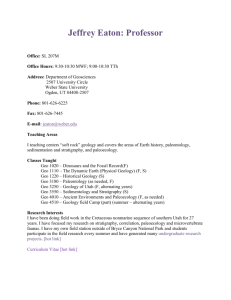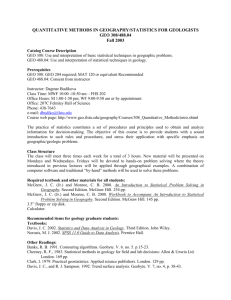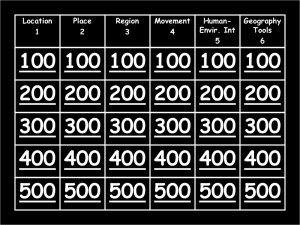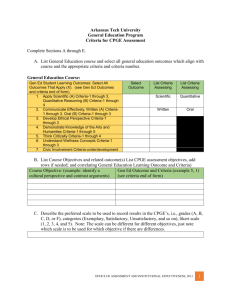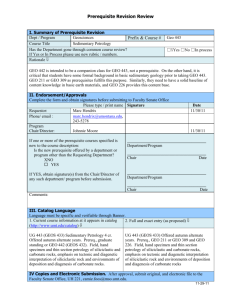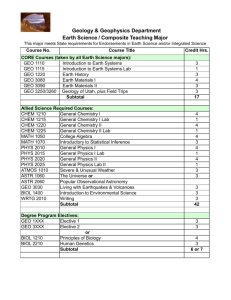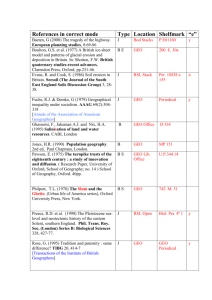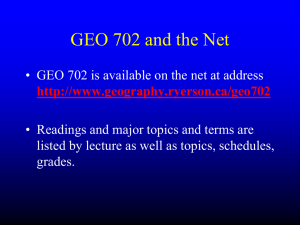PDF of this page
advertisement
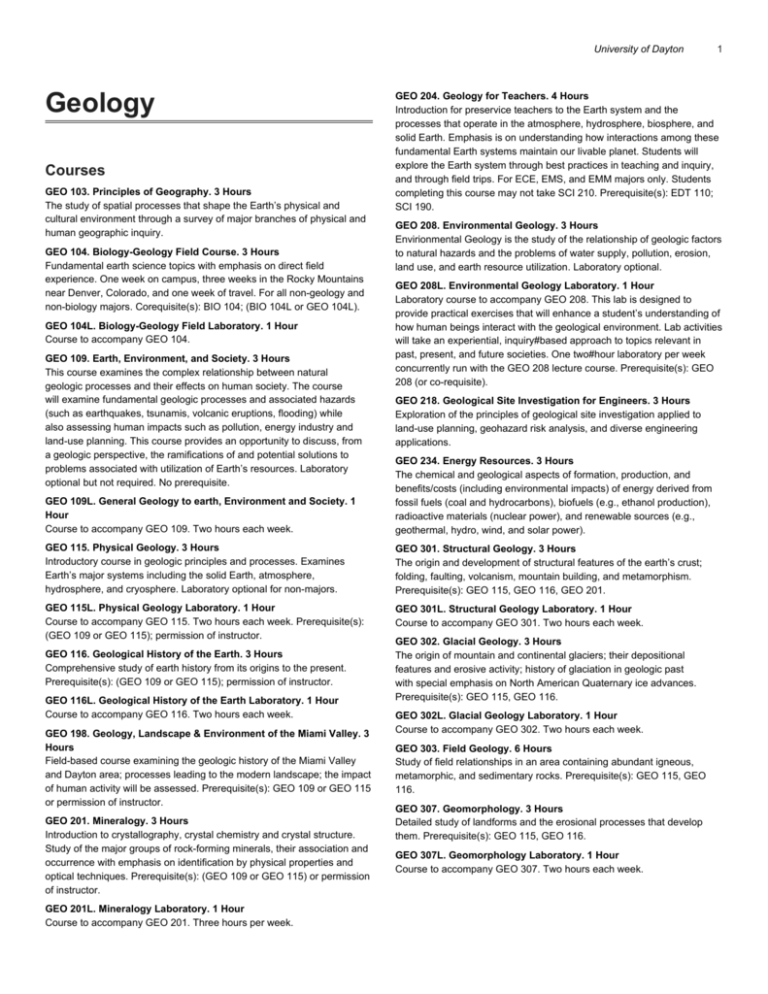
University of Dayton Geology Courses GEO 103. Principles of Geography. 3 Hours The study of spatial processes that shape the Earth’s physical and cultural environment through a survey of major branches of physical and human geographic inquiry. GEO 104. Biology-Geology Field Course. 3 Hours Fundamental earth science topics with emphasis on direct field experience. One week on campus, three weeks in the Rocky Mountains near Denver, Colorado, and one week of travel. For all non-geology and non-biology majors. Corequisite(s): BIO 104; (BIO 104L or GEO 104L). GEO 104L. Biology-Geology Field Laboratory. 1 Hour Course to accompany GEO 104. GEO 109. Earth, Environment, and Society. 3 Hours This course examines the complex relationship between natural geologic processes and their effects on human society. The course will examine fundamental geologic processes and associated hazards (such as earthquakes, tsunamis, volcanic eruptions, flooding) while also assessing human impacts such as pollution, energy industry and land-use planning. This course provides an opportunity to discuss, from a geologic perspective, the ramifications of and potential solutions to problems associated with utilization of Earth’s resources. Laboratory optional but not required. No prerequisite. GEO 204. Geology for Teachers. 4 Hours Introduction for preservice teachers to the Earth system and the processes that operate in the atmosphere, hydrosphere, biosphere, and solid Earth. Emphasis is on understanding how interactions among these fundamental Earth systems maintain our livable planet. Students will explore the Earth system through best practices in teaching and inquiry, and through field trips. For ECE, EMS, and EMM majors only. Students completing this course may not take SCI 210. Prerequisite(s): EDT 110; SCI 190. GEO 208. Environmental Geology. 3 Hours Envirionmental Geology is the study of the relationship of geologic factors to natural hazards and the problems of water supply, pollution, erosion, land use, and earth resource utilization. Laboratory optional. GEO 208L. Environmental Geology Laboratory. 1 Hour Laboratory course to accompany GEO 208. This lab is designed to provide practical exercises that will enhance a student’s understanding of how human beings interact with the geological environment. Lab activities will take an experiential, inquiry#based approach to topics relevant in past, present, and future societies. One two#hour laboratory per week concurrently run with the GEO 208 lecture course. Prerequisite(s): GEO 208 (or co-requisite). GEO 218. Geological Site Investigation for Engineers. 3 Hours Exploration of the principles of geological site investigation applied to land-use planning, geohazard risk analysis, and diverse engineering applications. GEO 109L. General Geology to earth, Environment and Society. 1 Hour Course to accompany GEO 109. Two hours each week. GEO 234. Energy Resources. 3 Hours The chemical and geological aspects of formation, production, and benefits/costs (including environmental impacts) of energy derived from fossil fuels (coal and hydrocarbons), biofuels (e.g., ethanol production), radioactive materials (nuclear power), and renewable sources (e.g., geothermal, hydro, wind, and solar power). GEO 115. Physical Geology. 3 Hours Introductory course in geologic principles and processes. Examines Earth’s major systems including the solid Earth, atmosphere, hydrosphere, and cryosphere. Laboratory optional for non-majors. GEO 301. Structural Geology. 3 Hours The origin and development of structural features of the earth’s crust; folding, faulting, volcanism, mountain building, and metamorphism. Prerequisite(s): GEO 115, GEO 116, GEO 201. GEO 115L. Physical Geology Laboratory. 1 Hour Course to accompany GEO 115. Two hours each week. Prerequisite(s): (GEO 109 or GEO 115); permission of instructor. GEO 301L. Structural Geology Laboratory. 1 Hour Course to accompany GEO 301. Two hours each week. GEO 116. Geological History of the Earth. 3 Hours Comprehensive study of earth history from its origins to the present. Prerequisite(s): (GEO 109 or GEO 115); permission of instructor. GEO 116L. Geological History of the Earth Laboratory. 1 Hour Course to accompany GEO 116. Two hours each week. GEO 198. Geology, Landscape & Environment of the Miami Valley. 3 Hours Field-based course examining the geologic history of the Miami Valley and Dayton area; processes leading to the modern landscape; the impact of human activity will be assessed. Prerequisite(s): GEO 109 or GEO 115 or permission of instructor. GEO 201. Mineralogy. 3 Hours Introduction to crystallography, crystal chemistry and crystal structure. Study of the major groups of rock-forming minerals, their association and occurrence with emphasis on identification by physical properties and optical techniques. Prerequisite(s): (GEO 109 or GEO 115) or permission of instructor. GEO 201L. Mineralogy Laboratory. 1 Hour Course to accompany GEO 201. Three hours per week. 1 GEO 302. Glacial Geology. 3 Hours The origin of mountain and continental glaciers; their depositional features and erosive activity; history of glaciation in geologic past with special emphasis on North American Quaternary ice advances. Prerequisite(s): GEO 115, GEO 116. GEO 302L. Glacial Geology Laboratory. 1 Hour Course to accompany GEO 302. Two hours each week. GEO 303. Field Geology. 6 Hours Study of field relationships in an area containing abundant igneous, metamorphic, and sedimentary rocks. Prerequisite(s): GEO 115, GEO 116. GEO 307. Geomorphology. 3 Hours Detailed study of landforms and the erosional processes that develop them. Prerequisite(s): GEO 115, GEO 116. GEO 307L. Geomorphology Laboratory. 1 Hour Course to accompany GEO 307. Two hours each week. 2 Geology GEO 308. Problems & Decisions in Environmental Geology. 3 Hours An in-depth examination of selected environmental problems and the way in which scientific information guides practice and policy. Topics will range from investigations of natural hazards to considerations of land use and water resources. Prerequisite(s): (GEO 109 or GEO 115) or permission of instructor. GEO 450. Applied Geographic Information Systems. 4 Hours Concepts and implementation of project design and analysis in geographic information systems (GIS). Students will learn the practice of GIS as a tool for spatial analysis, and as it applies in professional disciplines. The course will stress database design and present skills for data input, query analysis, and data output using GIS. GEO 308L. Problems & Decisions in Environmental Geology Laboratory. 1 Hour Course to accompany GEO 308. Two hours each week and periodic field work. GEO 455. Envrionmental Remote Sensing. 4 Hours Introduction to principles and concepts of remote sensing, a sophisticated technology of earth observation that provides fundamental data for global environmental investigation. Prerequisite(s): GEO 208 or permission of instructor. GEO 309. Surface & Groundwater Hydrology. 3 Hours This course is designed to provide a science or engineering student with the fundamental concepts and principles central to the study of water as a resource. This will include an examination of all components of the hydrologic cycle including surface-water hydrology and management, groundwater hydrogeology, and water resource management. Prerequisite(s): (GEO 109 or GEO 218) or permission of instructor. GEO 309L. Surface and Groundwater Hydrology Laboratory. 1 Hour Laboratory exercises to accompany GEO 309. Three hours per week. GEO 310. Stratigraphy. 3 Hours The interpretation of specific lithotypes and the synthesis of the stratigraphic record. Prerequisite(s): GEO 116. GEO 310L. Stratigraphy Laboratory. 1 Hour Course to accompany GEO 310. Two hours each week. GEO 401. Paleontology. 3 Hours The study of ancient life. The morphology, ecology, evolution, and stratigraphic distributions of selected invertebrates, vertebrates, and plants. GEO 401L. Paleontology Laboratory. 1 Hour Course to accompany GEO 401. Two hours each week. GEO 403. Sedimentology. 3 Hours Detailed study of sediments: their sources, environments of deposition, and methods of consolidation. Emphasis on the interpretation of ancient sediments. Prerequisite(s): GEO 201. GEO 403L. Sedimentology Laboratory. 1 Hour Course to accompany GEO 403. Two hours each week. GEO 404. Problems in Geology. 1-4 Hours Consideration of special problems involving advanced work in the laboratory and library; arranged to meet the needs of individual students. GEO 411. Petrology. 3 Hours Study of the formation of sedimentary, igneous, and metamorphic rocks. Prerequisite(s): GEO 201. GEO 411L. Petrology Laboratory. 1 Hour Course to accompany GEO 411. Two hours each week. Prerequisite(s): GEO 201. GEO 412. Introductory Geochemistry. 3 Hours Study of elementary thermodynamics, aqueous geochemistry, and principles governing the distribution of trace elements, radioisotopes and stable isotopes in igneous, metamorphic and sedimentary rocks. Emphasis on applications and solution of geological problems. Prerequisite(s): GEO 201 or permission of instructor. GEO 412L. Introductory Geochemistry Laboratory. 1 Hour Course to accompany GEO 412. Three hours each week. GEO 477. Honors Thesis Project. 3 Hours First of two courses leading to the selection, design, investigation, and completion of an independent, original Honors Thesis project under the guidance of a faculty research advisor. Restricted to students in the University Honors Program with permission of the program director and department chairperson. Students pursuing an interdisciplinary thesis topic may register for three semester hours each in two separate disciplines in consultation with the department chairpersons. Prerequisite(s): Approval of University Honors Program. GEO 478. Honors Thesis Project. 3 Hours Second of two courses leading to the selection, design, investigation, and completion of an independent, original Honors Thesis project under the guidance of a faculty research advisor. Restricted to students in the University Honors Program with permission of the program director and department chairperson. Students pursuing an interdisciplinary thesis topic may register for three semester hours each in two separate disciplines in consultation with the department chairpersons. Prerequisite(s): Approved 477; approval of University Honors Program. GEO 479L. Envrionmental Instrumentation Laboratory. 2 Hours The understanding and use of field and laboratory based equipment to study current environmental issues. Emphasis on team-centered approaches to investigating environmental problems. Prerequisite(s): (BIO 151, BIO 152) or (GEO 115, GEO 116) or permission of instructor. GEO 480. Senior Capstone Project & Presentation. 3 Hours Project and presentation in the scholarship, activity and/or practice related to the major. Students will present their work in a forum appropriate to the major. GEO 485. Geographic Information Systems Applications in Water Resources Planning & Management. 4 Hours An introduction to GIS applications in water resource management. Following an introduction to GIS basics, this course focuses on GIS techniques in surface water modeling and floodplain delineation and management. GEO 495. Geology Seminar. 1 Hour Introduction to professional practices in the geosciences. Students will attend seminar talks by guest speakers, research career options and graduate programs in the earth sciences, develop a professional resume, and participate in other profession-building activities. May be repeated. Prerequisite(s): Permission of instructor. GEO 498. Geological Research & Thesis. 4 Hours Research project within an area of the geological sciences, including, but not limited to, environmental geology, geochemistry, geomorphology, or paleontology. The results are to be presented in a written thesis. Prerequisite(s): Permission of instructor. University of Dayton GEO 550. Applied Geographic Information Systems. 4 Hours This course covers the fundamentals of Geographic Information Systems (GIS) technology and how it is being applied in such diverse fields as physical sciences, social/political sciences, planning, marketing, health, criminal justice, natural resources, and engineering. Students will learn the processes to collect, organize, analyze and display geographic data obtained from sources such as address geocoding, GPS, CD-ROM and World Wide Web sites. However, the emphasis of the course will be on data preparation and visualization based on sound knowledge of basic principles of cartographic design. Some preliminary data analysis techniques will be introduced but it is not an emphasis of the course. Each student will complete a series of mini projects that illustrate the typical steps in a GIS project. Major topics include: representation of geography, coordinate systems and map projections, principles of basic cartography, thematic mapping, data acquisition using GPS, geocoding, basic editing, and basic data management and exploration. GEO 555. Environmental Remote Sensing. 4 Hours Introduction to principles and concepts of Remote Sensing, a sophisticated technology of earth observation that provides fundamental data for global environmental investigation. Prerequisite(s): GEO 307 or Permission. GEO 560. Advanced Applications of Geographical Information Systems. 3 Hours Building upon GEO 450 / GEO 550, this course aims to broaden students’ understanding of GIS theories and emphasize advanced spatial analysis, modeling and visualization methodologies. Based on an applied approach, this course will use a variety of projects to illustrate these techniques. Prerequisite(s): GEO 450 / GEO 550 Applied GIS. GEO 585. Geographic Information Systems Applications in Water Resource Planning & Management. 4 Hours This course introduces GIS applications in water resource management. Following an introduction to raster-based modeling in GIS, it will focus on GIS techniques in surface water modeling and floodplain delineation and management. GEO 598. Capstone Project. 3 Hours This capstone course aims to integrate concepts and capabilities developed in previous courses (GEO 450 / GEO 550 and GEO 560) and to apply them in a realistic setting relevant to individual student interests. The course seeks to refine skills in project implementation using GIS, emphasizing project development, organization and management, presentation technique, and the use of modern information-acquisition and processing technology in GIS and/or Remote Sensing. Prerequisite(s): GEO 450 / GEO 550 Applied GIS; GEO 560 Advanced GIS. 3
